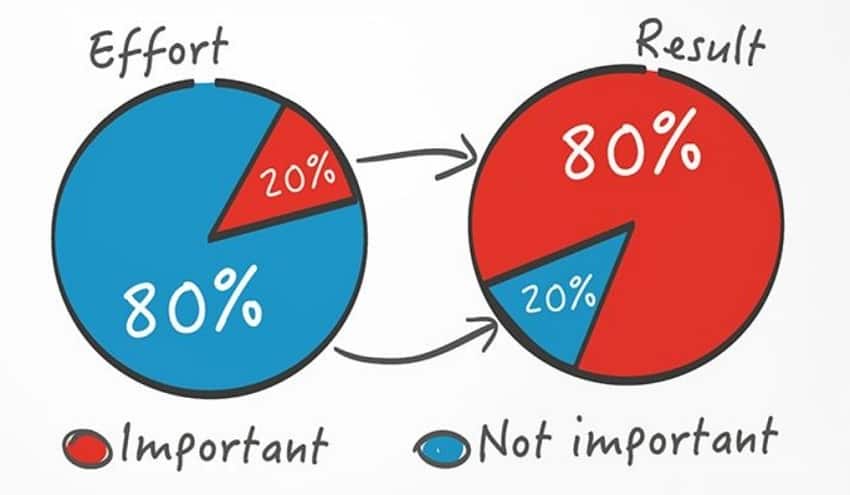Building our own villa rental business from scratch to consistently over 10 million Euro in revenue per year would not have been possible for us, if it wasn´t for this principle. We have used it to run and grow our company exponentially and still use it.
I learned it from reading the book ´The 4 Hour Workweek´ by Timothy Ferriss, in which he introduced me to Pareto Law, or the 8020 Rule.
We have been using it for the last 10 years and even today we (my business partner and I) say to each other ´Is this really 8020?´ It brings extreme focus to the facets of our business that we should pay attention to…..and ruthlessly ignore the rest.
This productivity tip actually changed my life. It will give you more focus and can give you more free time if you desire. I hope it will change your life as well.
I know that running a vacation rental business can be stressful and feel overwhelming enough. You can feel in ´reaction-mode´ all day and fall into the trap of not working ´on´ the business, but ´in´ the business. And you need that helicopter view to scale your operations and boost your profits.
You can do a million things that are ´vacation rental´ related……But are they the right things?
It was so important to me that I have made a video about it. It will not only improve your business, but you can apply it to the rest of your life as well.
If you would like to know how you can use this Tip best, check out this article, that combines the 8020 rule with your conversion funnel.
You will find the transcript beneath the video, in case you cannot watch it now.
Enjoy and let me know what you think! Stay updated through following us on Facebook!
Transcipt of the video:
Hey, guys. So you want to know the productivity secret of all the people who are really successful? In the last couple of videos, I explained you a couple of things. One is that there was a Top 5 Regrets of the Dying and the number two, and every man said it. It was I wish I would have worked less. And second thing that we spoke about: Scarcity, we don't know how much time we have left until we die. So it's better to do valuable things in the time that we still have.
Yesterday I spoke about Prado's law or the 8020 rule. And it's also called the rule of the Vital Few and Trivial Many. A couple of things are important and a lot of things are not so important.
Who Is This Hack For?
So who is this video for anyway? Because if we're talking about productivity. Who's it for? Well, if you have a job and you're working for somebody, you might say: Hey, this is this not too important to me. The one thing is because what you do and what you get it in time or in money. This seems to be not a very direct relationship.
Working For Somebody Else
I'll give you one example. If you work for a company and you make sure you find out ways that the company saves a million euros. Chances are very, very slim that the company will say: ´Hey, here you have the million euros, job well done! But on the other end, why is it still important for people who have a job? Is that when it does when it doesn't go well with the company, the people with the highest productivity are likely generally the last ones who will get fired. So even for you, it is important
Self Employed or (Vacation Rental) Business Owner
It's even more important for people who actually have their own company. Why? Because there's a very strong relationship between what you do and the output, what you put in and what you get out. Might it be money wise or time wise. And so for these two people, if you say: ´Yeah, but I'm not interested in productivity at all´, then everywhere where I say where I talk about money, you just think happiness.
Because really the rule, the 80/20 rule applies to everything. So it's still available. I'm gonna give some examples and I've written them down because there's some calculating going on. But let's start with that.
Example: Everything Is Equally Important
On a day where you work at a job. Let's say you work for 40 hours, that everything you do is equally important. So everything is equally important. Let's say you work 40 hours. Excuse the handwriting. I should have become a doctor, I think. Or something else. But my handwriting is not the best. Nowadays, it's all Siri and digital. So hardly any writing going on. Anyway, I did my best for you. This just shows how how important I think this is.
Okay. A also I'm gonna talk about numbers and you might say for answers here I'm gonna talk about: ´If you make fifty thousand a year, 50.000 euros a year you might say: ´Yeah, but I make a lot more´ or ´Yeah, I make a lot less.´ It's an example. Okay.
If everything is equally important that you do in a day a work for 40 hours, you make thousand euros. That means I calculated some weeks off birthday to make, 19 under 20 hours, which makes it 26 euro an hour day to make. But in this example, to make one hundred and everything's equally important to make one hundred thousand euros. How many hours do you think you have to work? Calculate, calculate. Okay. Yeah, it's 88. It's already a lot of hours per week.
If you want to make two hundred thousand euros. How many hours do you have to work. A hundred sixty. I'll tell you. There's only a hundred and sixty eight hours in a week. So you get eight hours of sleep in a week. So let's say that's virtually impossible.
But we're talking about here is averages. But I'm sure there are things that you do on a day that won't bring in the twenty six euros, but you only have a worth of about ten euros. So this is when everything's equally important. You see what you do. So every thing that you put in has the same result in getting out. You see how the math works. And that is almost impossible to scale it.

Example: 8020 Rule: Not Equally Important
Let's think 80/20. You still know what 8020 is. A couple of things are more important than a lot of other things. Not equally important. 80/20. OK. If we use the 80/20 rule, we know that it might not be exactly 80/20. But I'm going to tell you this as an example anyway, because it's very much put in your mind and it's easy. Calculating, eh? So let's say from what you put in, it's time we take 20 percent from that. And that leads to 80 percent of your output, which is money. We're talking about 80/20 now, 20 percent of the time that you put in actually accounts for 80 percent of the money. That means eight hours, which is 20 percent of 40 equals 40.000 euros (which is 80 percent of the 50.000). And so I'm using the same example as before, right. And then you have a choice:
You can say: ´Yeah, I'm only gonna work eight hours for forty thousand euros and that's okay with me. I'm happy with that.´ Or you can do more of the 20 percent tasks.
So how this works is that from you. Yet you have the output, which is money. Then you look at all the factors that lead to that money and you're going to list them and you put the most important ones on the left hand side and then less, less left, left, left, left, left, left. Less, less important. So if you're talking about the 20 percent, it's not that a 20 percent ´average time´, you can do whatever you want. No, you don't. You do. Only the tasks that you identified were the most most most important to get to that outcome. Yeah. So talking about that 20 percent is talking about the 20 percent that ever. So you can say, yeah, I did my 20 percent and now my for making forty thousand euros. Yeah, I'm good with that. That means that you have a lot of time to spare. Only you work for 40 hours and now only four.
But you can also say I'm going to do more of those 20 percent. Those most valuable tasks. The ones with the greatest output. I'm going to do more of that. Okay. You can, for instance, still work 40 hours. That means that the input is five times as much because you're going to do five times. The eight hours is 40 hours again.
That means that your output is also five times as much, which is 200.000 euros. And in the other example that we just used, we saw that two hundred thousand euros to get there. You had to work 160 hours. The thing that was almost impossible. But this shows that if you do the right things, that the most important tasks that you identified, you can actually make it good. Okay. Stick with me, because it's a lot of calculating. But I think this is pretty clear the way we do it now.

It Gets Crazier!
It gets even crazier. Yeah, really? Because within those twenty percent of tasks, which is most, most, most most important within those 20 percent, you still have an 80/20 within those tasks. It can be 50 within those tasks. You still have tasks that are more important than others. There's not 80/20. OK.
So it gets even crazier. We call this the 80/20 of the 80/20 or 80/20 squared or give it a name, but it's even more exotic. Look, 20 percent of the 20 percent of the time that you put in, that's actually 1.6 hours equals 80 percent of the 80 percent of the output of the money. It's 32.000 euros. If you take this.
Okay. You because still say, okay, I'm only going to work 1.6 hours and then I'm okay with the output. Let's make a calculation here. If you're still going to work 40 hours per week. But you´re only going to do to the task that you identified the 8020 of the 8020. The most important tasks. That means that you have an output of 800.000 Euros, which brings you to 416 euros per hour instead of the 26 that we calculated earlier.
And this is without overtime, just working to 40 hours a week. You could also say, okay, I'm gonna work part time only 20 hours for a 400.000 Euros.
´But how about all these tasks that I used to do that are only worth about 10 Euros an hour or 5 Euros an hour´ Just getting likes on Facebook, or I don't know what. Or maybe that's very important for your business. But for most businesses, it's not within the 20 percent. But if you're making eight hundred thousand euros, maybe you can find people who are willing to work for you for twenty six euros an hour or for €10 an hour.

So there you have it. We took Pareto Law, the 8020 law, and I showed you that if you put it on productivity, that the results are really skyrocketing and is something that we use in our in our business as well. A lot of other stuff that we that we got out of the ´4 hour work week´ book. And it really gave us a lot of time identifying. It gave us a lot of time because we were identifying which factors, which things are most important to do for the business to grow the business which we've done spectacularly and get somewhat more free time.
So you you can get the helicopter view. It brought us to the thing of working on the business and not working in the business better. The helicopter view. And for that, you really need time and you and you need some distance. So for us, it's been a it's been a great thing.
So if you notice now the 8020, you're gonna see it everywhere. And also, if you put it on happiness. You can also say I'll improve the relationship that I have with my daughter, I'd like to improve it. And so that's the output that I would like. What input should I give? I know that sitting next to each other, both with a with electronic device and headphones on……. OK. That's not part of the 20 percent that's gonna give the perfect outcome the better outcome.
So you have to identify which factors are most important to actually get where you want to go. And that's how you're going to use the 8020 in any case. What's the end goal that I want, which are the most important? Fixed on it and I'm gonna do those and I'm going to do more of those.
Okay. Hey, you have it. Let me know in the comments how you applied this. And I'd love to hear from you. And I thank you. Thank you for sticking with me with all this calculation stuff going on. So you don't have to have the regret. And unless you choose it. And that I will. I wish I would have worked less. Hey, see you in the next one.

